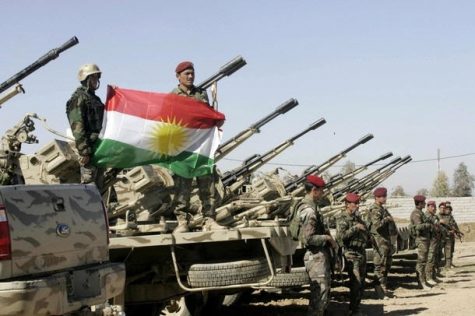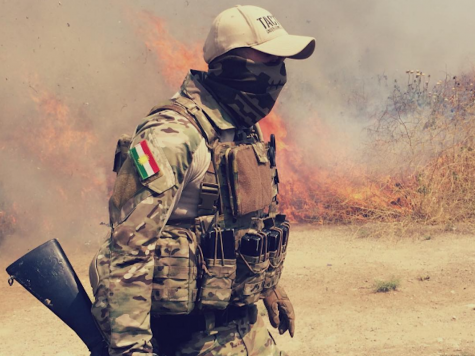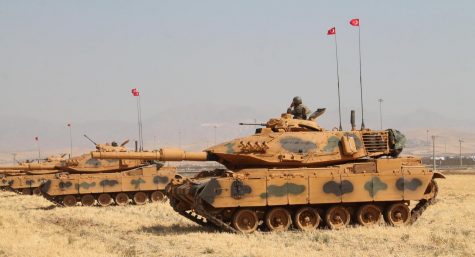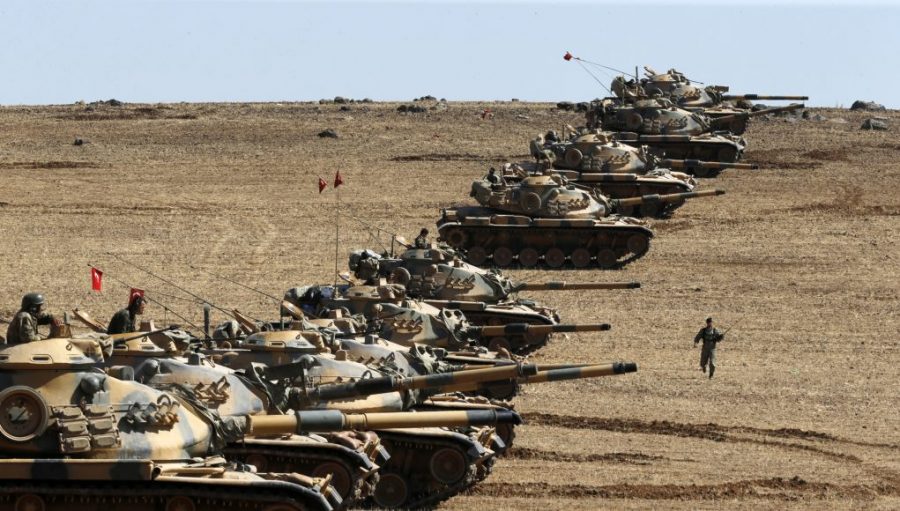Turkish tanks line up at the Syrian border prior to the assault (Image Source: Business Insider)
What Does Turkey’s Invasion of Syria Mean?
Turkey's launched an invasion of Northern Syria to remove Kurdish groups and villages from around their southern border. What's going on, why is it happening, and what does it mean for the region?
The Turkish Army has begun a massive push to eradicate Kurdish militias and other groups from the Syria’s Northern regions, with a large number of troops and armored units crossing into the country over the past two weeks. The invasion was proceeded by light but widespread shelling of civilians in Kurdish villages, and has drawn criticism from around the world (even Syria is partially critical of their actions). Germany, on an interesting side note, has recently vowed to renew ties with Turkey, and several older Leopard 2 tanks (Germany’s main battle tank) have been sighted among Turkish forces.
The Turkish army, who has been training for the better part of several years for this offensive, has made almost no gains against Kurdistan’s YPGs. They have contented themselves with harassment bombing and scattered shelling of small villages, though the offensive technically continues.
Who are the Kurds?

Kurds are an ethnic minority in a region referred to as Kurdistan, mainly situated in the North of Syria, the West of Iraq, and the South of Turkey. The Turkish government has been trying to get rid of the Turks for nearly a century now to no avail. They have outlawed the Kurdish language, branded Kurdish groups as terrorists, and even made speaking the words “Kurd” or “Kurdistan” a crime punishable by jail time. Aside from the cultural genocide, the Turks have committed several massacres of Kurdish civilians since the formation of the Turkish “Republic” back in ’23, putting them in the same boat as virtually every other minority in the former Ottoman Empire. However, the Kurds (referred to as “Mountain Turks” by Turkey up until ’93), are much hardier than the Turks give them credit for, and are still present in the modern day.
How are Regional Actors Responding?

The United States
Turkey has, in addition to the assault in Syria, threatened Iraqi Kurds (which the USM maintains direct ties with). The US has, in turn, said that it will maintain its support of the militias, despite Turkish threats if they do not withdraw. Any attempts to move on Kurdish strongholds in Iraq will result in direct conflict with the US, which the Turks will likely not recover from.
Russia
Russia has, to my surprise, actually threatened war with Turkey if they make any real gains against the Kurds. The Turkish offensive is a direct threat to Russian interests in the area. Moscow representatives have issued a statement that Turkish advances further into Syria will be “barred by a Russian assault”. To simplify, Russia is threatening direct action if Turkey dares to claim any more ground. Though, Putin has recently occupied himself with removing Iranian-backed militias from Syria, so this retaliatory assault may be slightly delayed.
Kurdistan
As mentioned before, the Kurds are holding out extremely well. You’d think a semi-modern army with somewhat decent training would be able to drive poorly equipped militias out with sheer numbers alone. However, the Kurds have several elements that the Turks never possessed; experience, grit, and an absolute need to hold their ground. These militias are aware of what Turkey will do to their people if they give an inch of ground, and are appropriately tenacious in the face of the invasion. Turkish advances have ground to a halt in the face of Kurdish resistance and will likely remain that way for some time. These groups have been seeing actual combat against an enemy that considers death as victory for the better part of seven years, and have the support of the most powerful military on the planet. The Turks will have their hands full no matter how they choose to proceed.
Syria
Assad has remained unusually quiet in the face of an outright invasion of his country, though it’s likely he wants the Kurds gone as badly as the Turks do. Kurdish units are included in the forces that oppose Assad’s regime, and given their performance, its understandable that he wouldn’t send his own troops against them. However, with Russia (sort of) stepping in on Syria’s behalf, they don’t really need to spend any more blood. So, their silence makes sense. Alternatively, they may be aware that the Kurds can hold out, and are simply saving face by letting them fight on their own.
Iraq
Iraq is essentially in the same boat as Syria, except they have the American military on their side, as opposed to Russian forces. The Turks have yet to launch an invasion of Iraq, but doing so will bring them into conflict with the US AND Russia (as they would need to take a foothold in Syria before they could invade Iraq), and that’s probably one of the most powerful deterrents for war aside from the nuclear option. Turkey, like the whole world, witnessed what happened to Iraq when they put themselves in America’s way, and would likely prefer not to bring that kind of war upon themselves.
Analysis of the Situation

Though Turkey claims that their offense is a “surgical attack on terrorists”, the reality is much more in-line with Turkish policy on warfare. Reports have painted a (bloody) picture of their so-called surgical strikes, consisting of indiscriminate killing of mostly Arab civilians. The Independent reported from a village near Afrin, the main objective of Turkey’s invasion, describing widespread shelling and airstrikes on noncombatants and refugees under Kurdish protection [X] . This is not a counter-terror operation. This is an attempt to ethnically cleanse the area and possibly annex a portion of Syria.
The Turks have been trying to dispose of the Kurdish people since the waning days of the Ottoman Empire, adding to a (long) list of massacres carried out by Turkish forces against ethnic minorities. Their moves to outlaw Kurdish culture and even criminalizing the recognition of the group are demonstrative of their passion to be rid of what they perceive as a meddlesome minority. We’ve already received reports of civilians being shelled indiscriminately, with aid workers caught in the crossfire. That constitutes two grave violations of the Geneva Convention in less than as many weeks.
Europe can’t take much any action against Turkey, as they’re a vital member of NATO, serving as a buffer to protect Europe’s Southern border. Syria’s too weak and too reluctant to exist, as is Iraq. The US and Russia have since moved their troops out of harms way, but both have pledged action if their allies or gains are threatened, with Moscow directly threatening to assault Ankara if they manage to punch through Kurdish lines (which seems unlikely at this point).
Turkey’s willingness to put itself in the way of the two most powerful armies puzzles me. In what alternate reality can a country as (comparatively) underdeveloped as Turkey hope to put itself at odds with the United States AND the Russian Federation and still fully believe it will be on the map for the foreseeable future? What’s going through Erdogan’s mind that makes him think this is a good idea? Surely, it can’t be anything sane.
[UPDATE]
Turkey has ceased operations towards their primary objective of Afrin village in northern Syria, in the face of threats from Moscow and Kurdish militias outclassing the Turkish army at every step. They have begun shifting their operations towards the village of Manbij, where the US led Joint Task Force (JTF) for fighting IS trains new recruits. Manbiji is primarily Kurdish and Arab, so those civilians are likely a tempting target for the Turkish armed forces.

